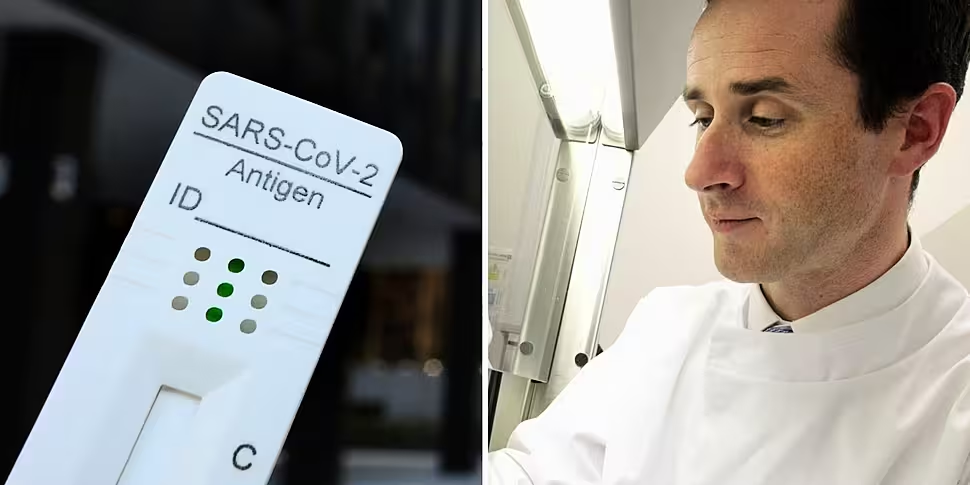A consultant in infectious diseases has said there are many more positive COVID-19 cases in the community than figures suggest.
Dr Eoghan De Barra was speaking after a record 16,428 new cases were confirmed here on Wednesday.
There has also been a rise in new admissions to hospital of COVID patients, at levels not seen since January.
Dr De Barra is a consultant in infectious diseases at Beaumont Hospital and a senior lecturer at the Royal College of Surgeons in Ireland.
He told Late Breakfast that the new year will bring new challenges.
"The first bit - and I've been highlighting it for a few weeks - is going to be staff shortages.
"That's what we've all been experiencing is trying to cover rotas, people have been an antigen-positive close contact, PCR positive one, somebody who's symptomatic.
"And it means in short order trying to fill gaps in rota and cover.
"And I think a lot of people are going to find that next week, when they return to work, is that some of their work colleagues won't be there."
He says we still do not know the full extent of COVID-19 infection.
"The testing system is completely full at the moment, I think we all know many people who've been up till midnight trying to get PCR slots.
"The system can't cope, and we don't have an idea of demand - at least the HSE doesn't release [to] us how many clicks they're actually getting to try to get slots.
"The 50% positivity rate is a vast over-estimate probably because of the number of people who are doing a follow-up on a lateral flow - an antigen test that was positive.
"So there are probably many, many more infections out there that either can't get a test, are not going to bother getting a follow on test, or indeed have such minimal symptoms that they're not going to get [a test]."
Dr De Barra says it is likely people have the virus, but are unaware.
"We know on - I think - the 16th of December in London, one in 20 people in London was positive... so there are many more positive cases.
"So I think I'd echo Tony Holohan's comment that the likelihood is, if you're going to meet up with some people today some of them are positive - likely unbeknownst to themselves."
'The country will grind to a halt'
He believes suggestions that people who had one variant may not catch another is unlikely.
"I think it's quite likely that an awful lot of us are going to get Omicron.
"The key bit at the moment is the ability to service the population who have other health needs, and the one's who'll get sick from Omicron.
"So if everyone just threw caution to the wind and got Omicron this week, the country will grind to a halt in the next two or three weeks.
"The healthcare, Gardaí, everybody - unless we just totally say 'Look, let it go everywhere'.
"I think through the course of January and into February, it may well be that large sections of the population get it.
"What that means into the future, how much immunity past Omicron provides for future variants, we just don't know that yet.
"In the UK up until the 20th of December, about 10% of the new Omicron cases were in people who had recently - within the last 30 to 60 days - had Delta".
And while testing can help, Dr De Barra says they are just a snapshot of a point in time.
"There's a challenge with either PCR or antigen is that they're just a point in time.
"And if you're a close contact, you've been exposed to a significant amount of the virus - and it means that over the subsequent and up to 10 days, and even a little bit longer, you are at risk of developing COVID.
"But just because you have a negative antigen test or PCR test on a certain day, doesn't mean that that's it.
"That just means at that point in time, on that day, that you don't have the infection.
"For me, this wave is the wave of the antigen - because it's so much quicker, and people are able to use them at home and get that information.
"But with antigen it's about doing serial testing... you don't just do one and say 'That's it', you do another one every other day - you keep doing it".









